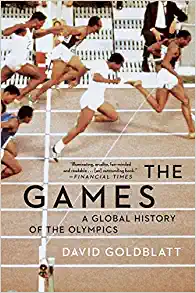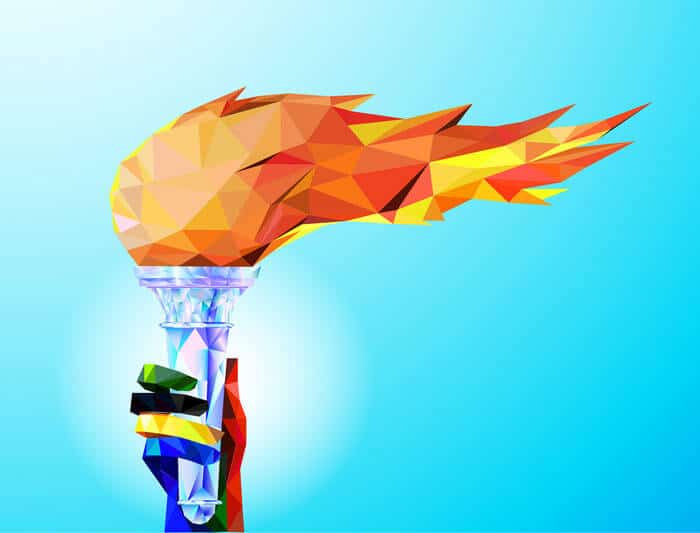The Games: A Global History of The Olympics by David Goldblatt
A week from today, The Winter Olympic Games will kick off in Pyeongchang, South Korea. As beloved are these world games where athletes from across the globe compete for the ultimate prize— an Olympic gold medal— the Games do have their drawbacks.
An ample amount of articles about corruption and bribery of officials belonging to the International Olympics Committee, protests in host countries where the construction of an Olympic stadium cannot be economically supported by local economies, and deaths related to the building stadiums under tight deadlines and without proper safety procedures have raised concern about how we celebrate the Games.
David Goldblatt, sports writer, journalist and sociologist, is also the author of The Games: A Global History of The Olympics. Here, he talked with BookTrib in a Q&A about how the Olympics got its start, the idea of the ‘dedicated amateur’ as a competitor and the future of the Games – and his answers might just surprise you.
BookTrib: This is probably the most comprehensive history of the Olympics, and you start all the way at the beginning of time. How did you go about researching this subject as thoroughly as you have?
DG: In stages. First, I co-wrote a cheeky alt-guide for London 2012, How to Watch the Olympics. Then I got serious and turned what I had learnt into an undergraduate course on the Sociology of the Olympic Movement and did the hard yards of reading what is out there. Doing the book itself took me, as they say in high performance sport, “to the next level”; days of watching old and obscure film footage, Olympic adverts and news reels, esoteric PhD’s and foreign magazines.
BookTrib: The Games starts with Baron de Coubertin and Tom Brown’s School Days, which is a unique starting point considering that book is about bullying in Rugby. Can you tell us how these origins of the modern Olympics in the British public schools relate to what we have come to know as the modern Olympic Games?
DG: De Coubertin fell in love with the whole public school sports ethic – that the playing of sports would generate the self-discipline, the moral fiber, the collective esprit de corps suitable for muscular Christian gentleman who would go on to rule both metropolis and the imperial domains. Quite how that kind of agenda is “non-political” while everyone else is “political” is one of the great ideological contouring tricks of the privileged and powerful. Of course, this kind of shtick is not the only ingredient brewed up to make the insane amalgam that is De Coubertin’s Olympism: late nineteenth century aristocrat private diplomacy was fused with a neo-hellenic cult of the ‘gentleman athlete’, too.
BookTrib: In recent years, corruption at the Olympics has been a top news story, specifically with the International Olympic Committee and the bidding process to host the games. The Olympics is also incredibly expensive for host countries who expect a significant return on their investment through tourism. Do you think that hosting is beneficial in the long run or do the problems outweigh the reward?
DG: No, is the short answer. As Andrew Zimbalist’s magnificent book Circus Maximus demonstrates with relentlessly footnoted precision, the Olympics does not bring any sustainable, long-term economic benefits (except to corrupt politicians, construction firms and real estate sharks). It can actually make things worse.
Consider this: London 2012 made more effort than any other Games to tie the event to raising sporting and exercise participation levels. In the years since the Games, participation rates have declined. As to beginning infrastructural development… ask Rio’s poor how things are going.
BookTrib: You talk about the “dedicated amateur”, how the competitors were these amateurs dedicated enough to their sport to give it everything they had every four years. We’ve seen the Olympics move from a competition of amateur athletes to one where a majority of athletes, coaching teams, therapists and trainers are all professionals. Do you think that there should be a move to bring the amateur component and does the IOC have anything to do with this shift to professional competitors, with arguably more financing?
DG: Amateurism as a category in the Olympics was abolished in 1992 – there are no such technical distinctions. The amateurism championed by the IOC was always an odious sleight of hand, designed to exclude as far as possible working people from participation in their sports. The Henley Rowing Committee – the model for the IOC – made it crystal clear in their rule book, which excluded from competition not only those that had rowed for prize money, but those that had rowed for a wage, indeed anyone who had been paid for manual labour. Commercialism and high performance sport have their pathologies; but Olympian amateurism dressed up in a fake moral carapace is dead (justified by entirely erroneous interpretations of Greek history) – let’s leave it that way.
BookTrib: From reading your book, it is clear the Olympics has truly evolved from its origins and it continues to evolve. Where do you see the Games going next?
DG: To the guillotine.
The Games: A Global History of The Olympics is now available for purchase. The 2018 Winter Olypmic Games begin on February 9, 2018.
Buy this Book!
Amazon




